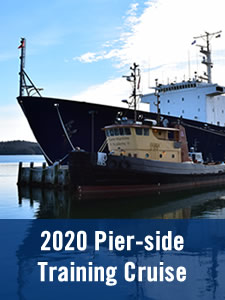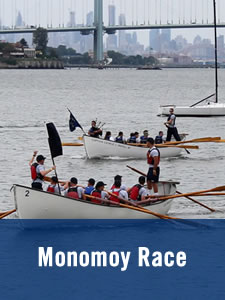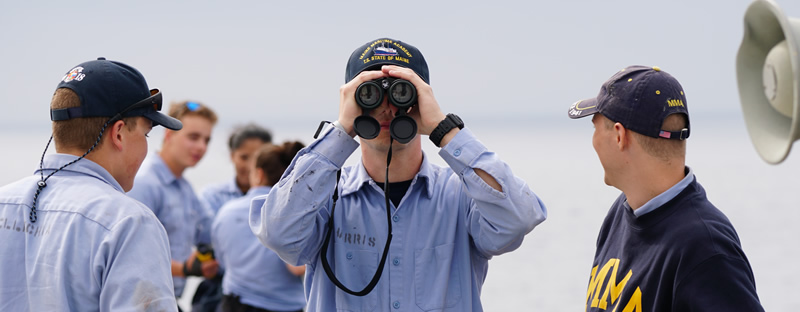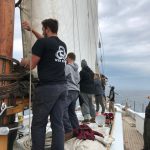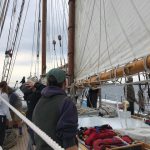About Maine Maritime Academy
Maine Maritime Academy is a public, co-educational college located in the coastal town of Castine, Maine. Our student population numbers approximately 950 students in courses of study in engineering, management, science, and transportation. Our rigorous courses and experiential programs equip students with the practical skills, knowledge, and training to launch successful careers upon completing an associate’s, bachelor’s, or master’s degree.
MMA students benefit from hands-on education, international sea-time aboard the Training Ship State of Maine or the Schooner Bowdoin, cadet shipping aboard commercial vessels, and cooperative education assignments. Our students become world-class mariners and engineers, supply chain managers, logistics professionals, and scientists here in Maine and beyond.
Maine Maritime Academy was ranked the #1 Best Public College on Money magazine’s Best Colleges list in 2014 and 2015. The college’s persistence, retention, and graduation rates are well above national averages. The job-placement rate for MMA graduates is in excess of 90 percent within 90 days of graduation.
Alumni of Maine Maritime Academy work all over the world. The success of our alumni has resulted in a worldwide reputation for excellence and reliability in maritime, business, and scientific fields. The alumni network connects MMA graduates with career opportunities in all of the industries and organizations we serve.
The college’s history dates back to 1941 when the Academy was founded by an act of the 90th Maine Legislature on March 21 of that year.
Undergraduate Programs
Our undergraduate programs serve approximately 950 students in courses of study in engineering, management, science, and transportation. Our rigorous courses and experiential programs equip students with the practical skills, knowledge and training to launch successful careers.
Specialized laboratories — including state-of-the-art simulators — bring lessons of the classroom to life. Advanced teaching facilities include research vessels, marine science labs, power plant and navigation simulators, a 1,200 hp diesel engine, a liquid cargo system simulator, wet lab, multi-media lecture halls, and classrooms with wireless access for laptop computing.
MMA students benefit from hands-on education, international sea-time aboard the Training Ship State of Maine or the Schooner Bowdoin, cadet shipping aboard commercial vessels, and cooperative education assignments. Our students become world-class mariners and engineers, supply chain managers, logistics professionals, and scientists here in Maine and beyond.
Loeb-Sullivan School of International Business and Logistics
The Loeb-Sullivan School’s M.S. degree programs prepare students for the challenges of managing logistics operations for global supply chains in a variety of industries. Students gain the ability to study, analyze, and evaluate the flow of goods, customer service, finance, and information from the suppliers to the ultimate consumer. All courses are taught by industry-experienced faculty.
The emphasis is on emerging concepts for global marketing, sourcing, inventory, distribution, and transportation management. Students also receive a strong business foundation in economics and financial accounting. Graduates complete the program with the ability to competently and confidently represent their company and contribute to their strategic effectiveness.
Master’s Programs
Choose from our two M.S. degree programs:
M.S. in International Logistics Management
This online degree program operates on a trimester system and combines core business courses with logistics-specific classes and labs. Students may enroll in the fall, spring, or summer. Courses can be taken in any sequence (except for BA660 Strategy which must be taken at the end of the program) and your degree can be completed in as little as 19 months. All courses are taught by industry-experienced faculty and can be completed anywhere, anytime.LEARN MORE
Maritime Port Manager Certificate
Upon successful completion of your master’s degree, you will also be awarded a professional certification as Maritime Port Manager (MPM) through The International Association of Maritime and Port Executives (IAMPE). MMA and IAMPE are working together to improve professional development for the maritime and port industry.
M.S. in Maritime Management
This program, also known as Master’s & Commander, combines online and on-campus courses that will position you for unique career opportunities in the maritime industry. Graduate courses are taught fully online for the M.S. in Maritime Management. Simultaneously, you will be enrolled in the undergraduate Small Vessel Operations (SVO) program on campus. At the completion of the two-year SVO program, you will have an opportunity to take the U.S. Coast Guard exam for the 200 Gross Ton Mate Near Coastal or Inland Waters license.LEARN MORE
Maritime Port Manager Certificate
Upon successful completion of your master’s degree, you will also be awarded a professional certification as Maritime Port Manager (MPM) through the The International Association of Maritime and Port Executives (IAMPE). MMA and IAMPE are working together to improve professional development for the maritime and port industry.
Training Ship State of Maine
T/S State of Maine
Training Ship State of Maine
Former Name: USNS Tanner, TAGS-40
Namesake: Capt Z.L. Tanner, USN, 1833 – 1906
Keel Laid: 22 September 1986
Launched: 28 August 1990
Operator: Military Sealift Command, 1990 – 1993
Conversion By: Interocean Ugland Management Corp., Voorhees, N.J. as General Agent for the U.S. Maritime Administration.
The USNS Tanner, TAGS-40, was built for the Navy as a fast Oceanographic Research Vessel by Bethlehem Steel Corporation at its Sparrows Point Yard in Maryland in 1990. The vessel was the second oceanographic research ship to bear the name of Zero Luther “Tanner” a noted Oceanographer and inventor of a patented sounding machine. The vessel experienced an engine casualty in 1993 and was laid up by the Navy and ownership transferred to the Maritime Administration. She lay idle in the James River Reserve Fleet until 1996 when she began a conversion process, which removed her underwater sonar domes and equipment. The (2) two original engines were removed and a new “one of a kind” power plant was installed, making her into a sophisticated high tech teaching platform for her mission of training men and women for careers as licensed officers in the Merchant Marine. The vessel was renamed the Training Ship State of Maine, and was modified to increase the accommodations from 108 to 302 persons. New lifesaving equipment and upgrades to existing equipment were accomplished as well as enhancements to the habitability requirements of the vessel. She was delivered to Maine Maritime Academy on 6 June 1997 and sailed her maiden training cruise the following week. The State of Maine is currently the flagship of the Maine Maritime Academy fleet, and provides an outstanding opportunity for midshipmen to get hands on experience afloat.
Hands-On Education
An integral part of a Maine Maritime Academy education is the practical knowledge that students gain by actual work experience. The commercial experiences are facilitated through the Career Services Office. A major component of all MMA programs is learning by doing. Experiential learning, including co-op and internships, varies from major to major and may include:
At-sea engineering and deck officer experience on training ships and commercial vessels;
Marine Biology and Marine Science cruises aboard research vessels;
Vessel Operations and Technology / Small Vessel Operations training aboard the tug Pentagoet, the schooner Bowdoin, and work experience on commercial vessels;
Power Engineering Technology and Power Engineering Operations training in operating plants that produce steam and generate electrical power;
International Business and Logistics experience in businesses, companies and logistics providers;
Design engineering and naval architecture experience for Marine Systems Engineering students.
Bowdoin Training Cruise
Annual Training Cruise: Schooner Bowdoin
Note: Due to Maine Maritime Academy’s COVID-19 response, the 2020 cruise has been postponed. Please check back often for updates to our schedule.
Maine Maritime Academy’s Schooner Bowdoin, a National Historic Landmark and the Official Vessel of the State of Maine, is the flagship of the Vessel Operations and Technology (VOT) program. Students in the VOT program navigate and maintain the 88-foot tall ship, with the help of six crew members, as part of their at-sea training during the summer months.
Students learn to fit out the schooner for the sailing season, terrestrial and celestial navigation, watchkeeping, vessel handling, emergency operations, passage planning and the entering and clearing of foreign ports.
A typical training cruise itinerary includes sailing into Canadian waters, such as Halifax or the Bra d’Or Lakes in Nova Scotia; coastal Maine destinations, such as Roque Island, Boothbay Harbor and Portland; and New England stops such as Portsmouth, New Hampshire and Provincetown, Massachusetts.
Maine Maritime Academy is the only college in the United States with a dedicated sail training program that leads to a U.S. Coast Guard license as mate on an auxiliary sail vessel. Students may start with no prior sailing experience and graduate with a Bachelor of Science degree, a USCG license, and all necessary certificates.
The Bowdoin enjoys a long history of seafaring education and Arctic exploration. Commissioned by explorer Donald B. MacMillan to facilitate his work in the high northern latitudes, Bowdoin has made 21 trips above the Arctic Circle, 18 of them before 1954 under the command of MacMillan. MacMillan sold Bowdoin to the U.S. Navy for use in World War II during the Greenland Patrol. After WWII, MacMillan bought the ship back for $3,000 and continued to sail her for nine more years around Greenland. After MacMillan’s retirement the boat belonged to the Schooner Bowdoin Association until 1988 when Maine Maritime Academy purchased the vessel for the purpose of training students.
Commercial Shipping Program
This program is for students in the U.S. Coast Guard limited- and unlimited-license majors.
Overview
Commercial shipping is a hands-on educational experience offered as an integral part of all of the USCG license tracks.
For many, the commercial shipping program is the first chance to experience working within a company setting in the maritime industry. All of the requirements of this program are designed to prepare students for real-life experiences, to challenge them professionally, and to provide opportunities to learn about their chosen profession.
Maine Maritime Academy was the first state maritime academy to incorporate this popular field experience program into its curriculum. The program now includes extensive preparation to maximize the learning experience in the real world of shipping. Because of the program’s popularity and success, some of the other state academies have adopted it, resulting in increased competition for available opportunities. Accordingly, the availability and timing of assignments cannot be guaranteed. Patience and flexibility are encouraged for students and families with regards to summer schedules.
The commercial shipping program has stringent requirements and processes; it is vital that students be aware of the requirements of their particular program shortly after arriving on campus.
Academy and Company Safety Standards
Students are expected to maintain the highest safety and professional standards at all times. Although students are not licensed officers during their commercial experience, they are expected to uphold high standards, and comply with all academy, company, and industry policies.
Commercial Shipping (Limited License Programs)
Students who are seeking a 200-, 500- or 1,600-ton USCG mate’s license are required to complete three separate academic courses and gain 240 sea days on appropriately sized vessels meeting both academic and licensing requirements. Students are encouraged to exceed the 60-day minimum requirement each summer on vessels and waters consistent with their specific license goals. Students in this program will gain the ability to work in the maritime industry and hold deckhand, able seaman and mate positions during their experiences. These students major in:
Small Vessel Operations (SVO)
Vessel Operations and Technology (VOT)
Students have the unique opportunity to prepare themselves professionally, create professional documents and participate in the hiring process to gain their summer field experience. This process is fully supported by the Office of Career Services and our partner companies by providing the following:
Resumé and cover letter assistance
Career coaching
Interview preparation assistance
LinkedIn profiles
Career fairs
On-campus recruiting
Planning for summer experiences starts early in the fall semester. The experience prepares Small Vessel Operations and Vessel Operations and Technology students to manage responses to employment opportunities and the hiring process, and prepares them professionally for their careers ahead.
Cadet Shipping Program (Unlimited License Programs)
During the summer after the sophomore year, unlimited USCG license students are assigned to merchant vessels as cadets for further familiarization in shipboard procedures. These students major in:
Marine Transportation Operations
Marine Engineering Operations
Marine Engineering Technology
Marine Systems Engineering
Candidates for the U.S. Coast Guard 3rd Assistant Engineer license must complete a total of 180 days of sea time. USCG 3rd Mate license candidates will be required to complete a total of 365 days of sea time. Sea time will be met through specialized laboratories, simulation, two training cruises, and cadet shipping.
Cadet shipping will involve training, watches, and maintenance in the students’ area of major.
In addition to the practical experience gained, students have the opportunity to visit ports of call in the United States and foreign countries. In several cases, students have circumnavigated the globe.
Many students find this experience to be a major advantage in finding employment following graduation.
Although it is not guaranteed, some students on cadet shipping assignments receive cadet wages and reimbursement for travel expenses.
Sea time: a minimum of 60 days is required for 3rd Assistant Engineer license candidates and 90 days for 3rd Mate license candidates, which is credited toward the sea service required for a USCG license.
Each student must submit a satisfactory Sea Project, Cadet Shipping Evaluation/Report, Ship’s Officer’s Evaluation Report, and evidence of appropriate sea time to be awarded course credits.
A passport, a drug-free certificate, and a merchant marine document are a few of the required documents for all students who are cadet shipping.


